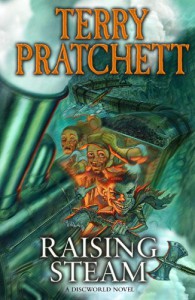Raising Steam - Terry Pratchett

Raising Steam, the fortieth novel (apparently) in Terry Pratchett's immensely popular and immensely funny Discworld series, sees the steam engine (read, atmospheric pollution, industrial accidents and noise) comes to Ankh-Morpork, and, of course, Moist von Lipwig, reformed criminal and scoundrel, is in at the bottom.
I don't really know what to say about Raising Steam. On the face of it, it follows (alas) the general pattern of recent Pratchett novels: stilted dialogue, undifferentiated characters (Lipwig is largely indistinguishable from Commander Vimes of the Watch) and weirdly uninteresting action which often feels more like a plot summary than an actual plot. None of this is improved by the fact that Pratchett appears to have chosen a Grand Theme (religious extremism) around which to write his novel, instead of writing a novel that becomes about religious extremism. It's all very contrived.
And yet. It often feels like there is another kind of novel peeping through the wreckage of Discworld, one much darker and stranger and more serious, one that is smothered by attempts at humour which no longer work and familiar characters I no longer recognise. There's one passage about halfway through about cultural appropriation which I found thought-provoking and extremely promising:
...what would happen if goblins learned everything about humans and did everything the human way because they thought it was better than the human way? How long would it be before they were no longer goblins and left behind everything that was goblin, even their pots?...Will goblins really stop taking an interest in their pots and will humans learn the serious, valuable and difficult and almost magical skill of pot-making? Or will goblins become, well, just another kind of human? And which would be better?
Perhaps, in an earlier Discworld novel, this question might have been raised through plot rather than exposition, but that's not really the point here. It's a point about fantasy readers, I think: as fantasy readers, of course we want our goblins to be goblins and our dwarfs to be dwarfs, but does that transfer to the real world? Do we want cultures to remain separate and unique, or do we want them to integrate, to make one, vast, homogenous, global culture? And which would be better?
At the end of the day, Raising Steam is not a bad novel. It's certainly better than Snuff and infinitely better than Judgement Day. There is, I think, a future for Discworld, but it will look very different from its past.
 3
3


